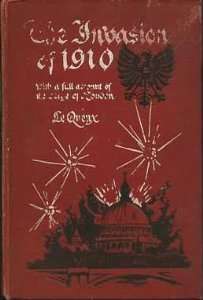The Invasion of 1910
The Invasion of 1910 is a 1906 novel written mainly by William Le Queux (along with H. W. Wilson providing the naval chapters). It is one of the most famous examples of invasion literature. It is viewed by some as an example of pre-World War I Germanophobia. It can also be viewed as prescient, as it preached the need to prepare for war with Germany.
 First edition | |
| Authors | William Le Queux H. W. Wilson |
|---|---|
| Country | United Kingdom |
| Genre | Invasion literature |
| Set in | United Kingdom, 1910 |
| Publisher | E. Nash |
Publication date | 1906 |
| Media type | Print (hardback) |
| OCLC | 59567217 |
| Text | The Invasion of 1910: With a full account of the Siege of London at Wikisource |
Background
The novel was originally commissioned by Alfred Harmsworth as a serial which appeared in the Daily Mail from 10 March 1906. According to historian of Germany Sir Richard Evans, the paper built up "mass alarm" by dressing its London newspaper vendors as Prussian soldiers complete with pickelhaube helmet and placards showing maps of where the 'troops' would be next day.[1] The rewrite of the story, featuring towns and villages with large readership of the Daily Mail,[2] greatly increased the newspaper's circulation and made a small fortune for Le Queux; it was translated into twenty-seven languages, and over one million copies of the book edition were sold.[3] The idea for the novel is alleged to have originated from Field Marshal Earl Roberts, who regularly lectured English schoolboys on the need to prepare for war.[4]
To Le Queux's dismay, a pirated and abridged German translation (with an altered ending) appeared the same year: Die Invasion von 1910: Einfall der Deutschen in England translated by Traugott Tamm.[4]
In Le Queux's earlier novel, The Great War in England in 1897, it is France which invades Britain as an implacable enemy. In that book's plot, German soldiers land in Britain as allies coming to help repulse the French invasion, and are welcomed as saviours. In between Le Queux's two disparate depictions of an invaded Britain, the Entente Cordiale of 1904 changed the diplomatic and military landscape.
Outline
The book takes the form of a military history and includes excerpts from the characters' journals and letters and descriptions of the fictional German campaign itself.
It is centred on an invasion by the Germans, who have managed to land a sizeable invasion force on the East Coast of England. They advance inland, cutting all telegraph lines and despoiling farmland as they go, and the British struggle to mount a proper defence, fighting a battle at Royston. The Germans eventually reach London and occupy half the city. A junior Member of Parliament declares that "Britain is not defeated" and organises a resistance movement, the "League of Defenders," despite harsh reprisals by the Germans and a severe lack of arms. The Germans seem unable to combat this and tighten their control of London and suddenly find themselves faced with a popular uprising. Eventually, a newly formed British Army marches to liberate London. The fictional war, however, is a stalemate since it appears that German forces have managed to occupy Belgium and the Netherlands.
Agenda
The failure of the British government to prepare for a possible invasion is repeatedly mentioned, as is the phrase "they should have listened to Lord Roberts", along with many references to Roberts' patriotism. It is also pointed out that the invasion might have been counteracted more easily if every able-bodied man had had military training. Le Queux himself stated that one of his aims was to "bring home to the British public vividly and forcibly what really would occur were an enemy suddenly to appear in our midst".
Film version
Le Queux's novel attracted the attention of the Gaumont Cinematograph Company in 1912, who planned to change the title to The Raid of 1915 and to film two endings, one with Britain as the victor and one with Germany as the victor. The British satirical magazine Punch suggested they show the Britain victorious version in Germany and the other version in Britain. The film was finished in 1913 but its release was delayed by the British Board of Film Censors and when it was finally released in October 1914 (three months after the start of World War I), it had again been retitled, to If England were Invaded.[5]
Notes
- "The Riddle of the sands". In Our Time. 12 June 2008. 36 minutes in. Retrieved 6 March 2017.
- Eby, Cecil D. (1988). The Road to Armageddon: The Martial Spirit in English Popular Literature, 1870–1914. Durham, North Carolina: Duke University Press. p. 33. ISBN 0-8223-0775-8.
- Clarke, I.F. (November 1997). "Future-War Fiction: The First Main Phase, 1871–1900". Science Fiction Studies. DePauw University. Retrieved 14 August 2008.
- Sladen, N. St. Barbe (1938). The Real Le Queux: The Official Biography. London: Nicholson & Watson.
- Waller, Philip J. (2006). Writers, Readers, and Reputations: Literary Life in Britain 1870–1918. Oxford University Press. pp. 9. ISBN 0-19-820677-1.